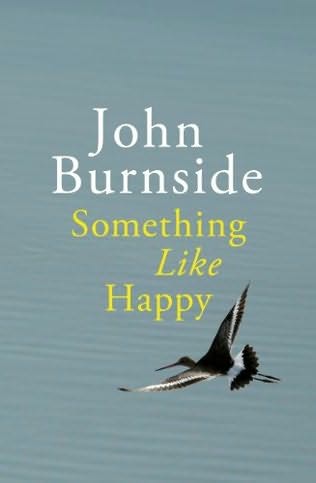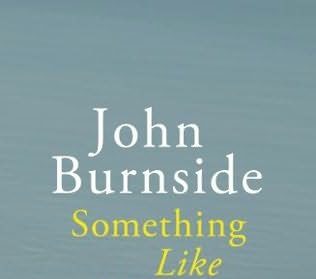John Lavin reviews Something Like Happy, a collection of short stories by TS Elliot and Forward award-winning writer John Burnside.
I have long believed that a particular kinship exists between the short story and the poem. This sororal link may be thought of as a shared desire to examine the small details of life and to be, as Paul Muldoon once put it, ‘Prince of the Quotidian.’ To not only examine these small details for their own sake but to pay attention to them with scientific rigour so that new discoveries may be made about our inner and outer lives. Ordinarily the best poets and short story writers, while being intuitively conscious of this shared area, tend to fall into one camp or the other. This is ordinarily brought about by the simple realisation that they are not as good at one form as they are at the other. Frank O’ Connor famously said that he only became a short story writer (and let us not forget one of the great short story writers) after he had realised that he wasn’t good enough to be a lyric poet (which had always been his ambition.) Joyce set out wanting to be a poet but ended up writing Dubliners, arguably the greatest short story collection ever written and without question, superior in every way to the poems he placed so carefully in Chamber Music and Pomes Penyeach. Raymond Carver considered his poetry to be as important as his short stories, if not more so, which is something that few people would agree with, even if in terms of theme and aesthetic they are close to identical. Speaking of the similarity between the two forms Carver famously said that:
I made the story just as I’d make a poem; one line and then the next and then the next. Pretty soon I could see a story – and I knew it was my story, the one I had been wanting to write.
And perhaps it is this poetic approach to the craft of short stories which, at least in part, makes his short fiction so particularly arresting. His stories, in a sense, are his poems made into a drama.

by John Burnside
I mention this because it is particularly apposite in the case of John Burnside, a writer who pulls off the, if not unique, then certainly very rare trick of writing short stories and poems which are the equal of one another. And because he, like Carver, appears to approach the short story in just the same way as he would ‘make a poem.’ The stories collected in his new volume Something Like Happy (which is his first book since the TS Eliot and Forward prizewinning poetry collection, Black Cat Bone) very often share a shape and a sensibility with poetry. The best pieces here veer off in unexpected directions without giving the reader a moment’s notice. They follow their own logic, which is a difficult trick to pull off successfully and firm evidence of an author in omniscient control of his invented worlds.
By way of example, the hub of a story about domestic violence like ‘Slut’s Hair,’ is not so much the man extracting his wife’s tooth with a pair of electricians’ pliers – something which takes place off the page – but the painkiller woozy wife’s mistaking of a piece of fluff – sometimes known in Scotland as slut’s hair – for a small mouse:
Her vision was blurry, and what she could see was something vague and unfinished, like a scribble in blue ink among the wet shadows – something impossible, she thought, though it was definitely there.
This paragraph and especially that lyrical ‘scribble in blue ink among the wet shadows’ could easily be interpreted as Burnside’s artistic manifesto in a collection which is always concerned with perception and which suggests that the space in-between what we consider real and what we perceive to be imagined is equally worthy of examination. Note the use of that word ‘unfinished’ in the above quotation: the ‘unfinished’ is Burnside’s territory; an amorphous space where his characters feel, or come to realise, that they are neither one thing nor another.
In ‘Slut’s Hair’ the woman hears something rustling by the tumble dryer but only sees some fluff, ‘like the stuff you find under the bed in an old person’s house.’ Only the fluff moves and she realises that it is an animal trying to find a way out of her third floor tenement flat. At first she thinks it is a ‘tiny malnourished cat,’ then a fox – ‘only that was impossible because foxes weren’t blue’ – and it was, in any case, too small for that, in fact ‘tiny – which meant that it had to be something else, something possible.’ The woman realises it is a
A small, long-haired, powder-blue mouse with tiny feet and a sharp, clever face, gazing up at her from the shadows.
She knows at once that she must protect it from her husband who is due to return drunk from the pub at any moment. The woman is not able to deal with her own feelings about her abusive partner partly because she has not been brought up to think of emotions as a fit and proper thing to think about but mostly because she is terrified of him and, like a lot of victims of abuse, she can see no way out of her situation. And so she becomes desperate to save the mouse, transferring all of her own fear and desire for escape onto it:
She was surprised to discover that she wasn’t afraid, but the animal was. It was terrified, in fact, and desperate to get out, scared and lost and far away from its own kind, its wet, black eyes gazing up at her, so shiny and wet and hopeless that she felt a sudden desperate need to gather it up and spirit it away… because Rob would kill it.
All the while Burnside is careful to emphasise the woman’s pain and painkiller blurred consciousness and we begin to see that he is not so much interested in what is actually there but in what the woman thinks might be there and why. Just as she picks the mouse up, her husband arrives home and so she has to go to meet him with the mouse hidden in her hands. The reader is fraught with tension at this stage of the story but Burnside is mostly interested in tension of this sort in an incidental way because he then has his protagonist realise that she didn’t pick up the mouse at all, and that she had:
Come up with nothing more than a fistful of dust and – what was it you found in dark corners where nobody had cleaned? Slut’s hair.
This inherent hopelessness and tragedy of the woman transferring her innermost feelings of anguish and fear onto something that isn’t even there, are, at the same time, contrasted with the fact that while the mouse ‘existed’ it had represented a symbol of beauty and hope to her:
It was nothing but a mouse, she knew that, a tiny blue mouse with a stitched-shut mouth and oversize ears, but it had come to her and nobody else.
John Burnside has spoken about incidents like this appearing in his work as being informed by his pre-writerly struggles with mental illness:
I was in and out of hospital and medication regimes for a while, and that was oddly interesting; eventually I diagnosed myself as having apophenia—a kind of extreme tendency to find sometimes beautiful and sometimes terrifying patterns and images in seemingly random phenomena… I think it is necessary to talk about experiences of that type.
In Something Like Happy John Burnside takes us time and time again to these further reaches and blurry viewpoints but never without rooting each piece firmly in the everyday. It is while on this sure, quotidian footing that, as in ‘Godwit’ – another story about small town violence – the sudden sea mists descend, leaving us disorientated and in danger of taking a wrong turning into quicksand.
John Lavin is an avid contributor to Wales Arts Review.











